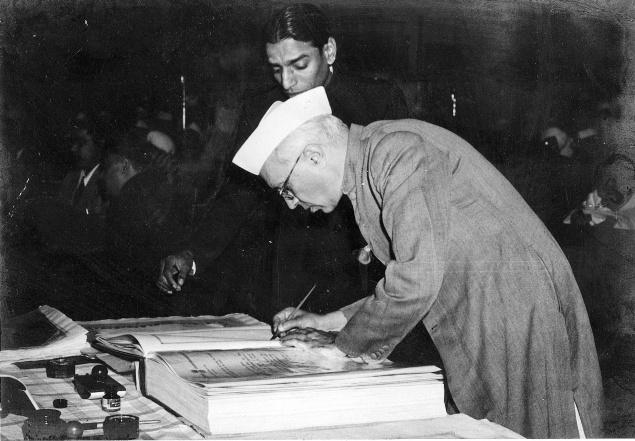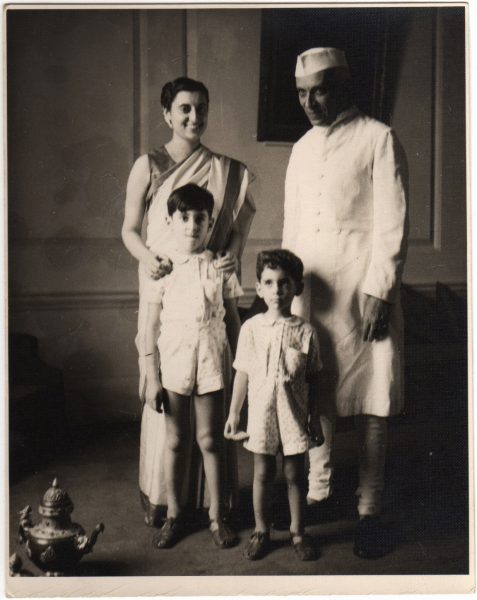
Why Jawaharlal Nehru’s legacy refuses to fade away in Narendra Modi’s India

In a departure from the usual political posturing that dominates politics, Prime Minister Narendra Modi took his supporters and critics off-guard on Saturday by paying tributes to Jawaharlal Nehru, his ideological antithesis, on his 59th death anniversary. “On his death anniversary, I pay tributes to our former PM Pandit Jawaharlal Nehru,” Modi wrote on Twitter.
While the gesture is not new as Modi has done the same on Nehru’s birth and death anniversaries, the surprise is more to do with the fact that it comes close on the heels of the Karnataka rout, which has left the BJP in a huddle, and the rising acrimony between the ruling party and the Opposition over the inauguration of the new Parliament building.
As a staunch advocate of Hindu nationalism and a critic of the Nehruvian model, Modi’s political narrative, ever since his ascension in 2014, has been centred on promoting a more assertive and nationalist agenda, often distancing himself from the secular and socialist principles associated with Nehru.
Nehru, along with Mahatma Gandhi, remains relevant despite the rise of Hindutva. The legacy of Nehru, who played a crucial role in shaping the Indian Independence movement and laid the foundation for a democratic and secular nation, can never be overshadowed, undermined or wished away.
Also read: ‘Vajpayee: The Ascent of the Hindu Right’ review: Moderate in wrong party or radical?
“Upon the Mahatma’s assassination, Nehru became the keeper of the national flame, the most visible embodiment of India’s struggle for freedom. Incorruptible, visionary, ecumenical, a politician above politics, Nehru’s stature was so great that the country he led seemed inconceivable without him,” wrote Shashi Tharoor in the preface to the 2011 edition of Nehru: The Invention of India (2003).
The Nehruvian vision
As India’s first Prime Minister, Nehru — a suave and eloquent leader, adorned in his trademark jacket and armed with lofty ideals — was instrumental in guiding the country through its formative years and laying the groundwork for its modern institutions. His vision of a socialist, secular, and industrialized India had a profound impact on the nation’s development. It is a vision that is deeply ingrained in the Indian ethos; his principles of tolerance, religious harmony, and social welfare are intrinsic to India’s fabric and continue to shape public discourse.
While Hindutva proponents may prioritize different aspects of India’s history and cultural identity, it does not diminish the contributions and values espoused by Nehru, whose advocacy for peace, justice, and human rights resonated beyond India’s borders, earning him admiration and respect worldwide.
Nehru’s writings, speeches, and letters serve as windows into his mind, revealing a man of profound intellect and foresight. In The Discovery of India, he unearths India’s rich cultural heritage, inspiring a renewed sense of national pride. Through his elegant prose, Nehru paints a vivid picture of a country teeming with diversity and potential, ready to stride into the future.

Nehru envisioned an India where people of all faiths and backgrounds would coexist harmoniously. In his famous “Tryst with Destiny” speech on the eve of India’s independence, Nehru proclaimed, “The service of India means the service of the millions who suffer. It means the ending of poverty and ignorance and disease and inequality of opportunity. The ambition of the greatest man of our generation has been to wipe every tear from every eye. That may be beyond us but as long as there are tears and suffering, so long our work will not be over.”
Statesmanship and appeal
Nehru’s vision extended beyond the borders of India. He championed the principles of non-alignment, advocating for a world where nations could pursue their own paths, free from the shackles of Cold War politics. In his letters to world leaders, he articulated a global vision grounded in peaceful coexistence and mutual respect, highlighting his belief in diplomacy and international cooperation as tools for progress.
Also read: ‘Caste Pride’ review: Manoj Mitta illuminates caste’s legal odyssey in post-Independent India
Nehru laid emphasis on education as the key to empowerment; he ardently believed that education was the cornerstone of a vibrant democracy, and he championed the establishment of institutions of higher learning, such as the Indian Institutes of Technology (IIT) and the Indian Institutes of Management (IIM). “The children of today will make the India of tomorrow. The way we bring them up will determine the future of the country,” he said once. His compassionate nature earned him the endearing title of “Chacha Nehru” among children.
In Nehru’s vision, art, culture, and scientific inquiry flourished hand in hand with political progress. He recognized the importance of nurturing creativity and intellectual curiosity, fostering an environment that would propel India forward. His support in founding the Council of Scientific and Industrial Research and the Indian Council for Cultural Relations (ICCR) exemplified his commitment to fostering a holistic and progressive society.
The enduring legacy
As we reflect on Nehru’s life and works, we find that his ideas continue to reverberate through the corridors of time even though India, in the 21st century, has drastically moved away from his ideals. As India continues to evolve and face new challenges, his principles offer a guiding light. He believed in a united and inclusive India. He held democratic values, independent judiciary and free press as sacrosanct. Nehru’s legacy is intertwined with his significant contributions to science, and industrialization in India, fostering a culture of innovation.
Nehru, despite his undeniable contributions, has not been immune to criticism. Yet, it is precisely this diversity of perspectives that highlights the enduring relevance of his ideas. His commitment to pluralism, inclusivity, and a secular ethos remains vital in a country as diverse as India. His emphasis on women’s empowerment and social welfare programmes reflects a concern for the welfare of all citizens, particularly the marginalized and the underprivileged.
While Modi’s tribute to Nehru may appear as a gesture of respect, we must recognize it as a mere lip service, which does not negate the Hindutva Parivar’s track record of whipping up hatred among communities — sometimes overtly and, at other times, through innuendos. It should be seen for what it is: a blip in Modi’s otherwise carefully orchestrated, and unfailingly divisive, rhetoric — a defining characteristic of his leadership.
The golden sceptre and the spectre of failure
If Nehru established a strong foundation for India’s democracy, Modi has consistently weakened the democratic institutions, centralizing power in his hands and curbing dissent. One has the nagging sense that Modi has been trying to cast himself in the mould of Nehru, eager to go down in history as a leader of the same stature as India’s charming first PM, who was widely adored.
We have seen how Modi has appropriated the Nehru jacket in order to connect with the sartorial style associated with Nehru and project a statesman-like image. His plan to receive the golden sceptre (sengol in Tamil) during the inauguration of the new Parliament building on Sunday can be seen as a strategic move towards this goal.
By replicating the ceremonial transfer of power that took place in 1947 when Nehru received the sceptre, it will not be far-fetched to conclude that Modi is perhaps attempting to draw parallels between himself and the leader, projecting to portray himself as a successor to Nehru’s legacy and align himself with the ideals and symbolism associated with the early years of India’s independence.
Modi’s attempt, however, is unlikely to succeed. For the simple reason that while Nehru was known for his inclusive and pluralistic vision of India, Modi’s tenure as PM has been marked by policies that have often marginalized minority communities and shattered secular principles.
Also read: ‘First Flood’: Nandini Krishnan on translating Kalki’s Tamil magnum opus Ponniyin Selvan
The true test of a leader lies in his actions and the impact he has on the society he governs. Today, under Modi’s watch, the spectre of communal tensions and social unrest cast a shadow over the dream of a united India. Economic inequalities persist, the pace of job creation remains hopelessly slow and the gap between the haves and the have-nots continues to widen. Agrarian distress and environmental concerns raise questions about good governance and the need to strike a balance between development and sustainability. Incidents of lynching by cow vigilantes are sporadic but commonplace.
Activists, journalists, and individuals expressing dissenting opinions have been selectively targeted since 2014. They have faced harassment, intimidation, and even threats from both state and non-state actors. This includes surveillance, arbitrary arrests, physical attacks, and online harassment. All this has created an atmosphere of fear and self-censorship, limiting the space for individuals to express their opinion in a free manner.
In a nutshell, religious polarization, the erosion of democratic values, and the handling of certain issues such as human rights, freedom of expression, and minority rights all serve as dark spots on Modi’s reign. Above it all, it is the fraying fabric of social cohesion that has caused tremendous damage to the idea of India Nehru believed in. As Manipur burns and thousands are displaced, Modi has chosen to stay silent. Neither has he uttered a word on the women wrestlers out in the streets for weeks, seeking justice.
Nehru’s vision of a resurgent India, where progress is intertwined with compassion and intellectual curiosity, has an abiding appeal. His ideas and ideals will endure, illuminating the path towards a brighter and more inclusive future for generations to come.


